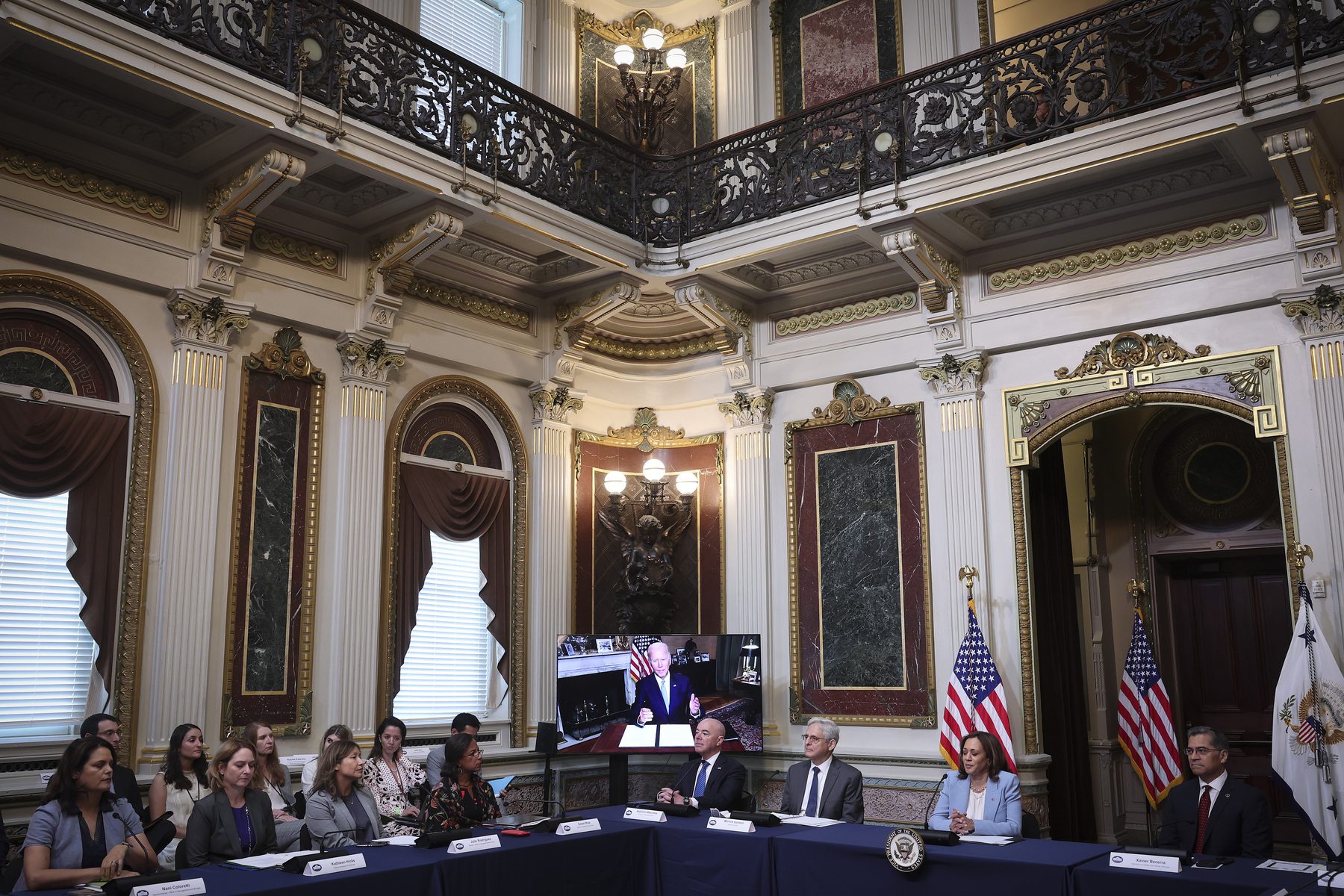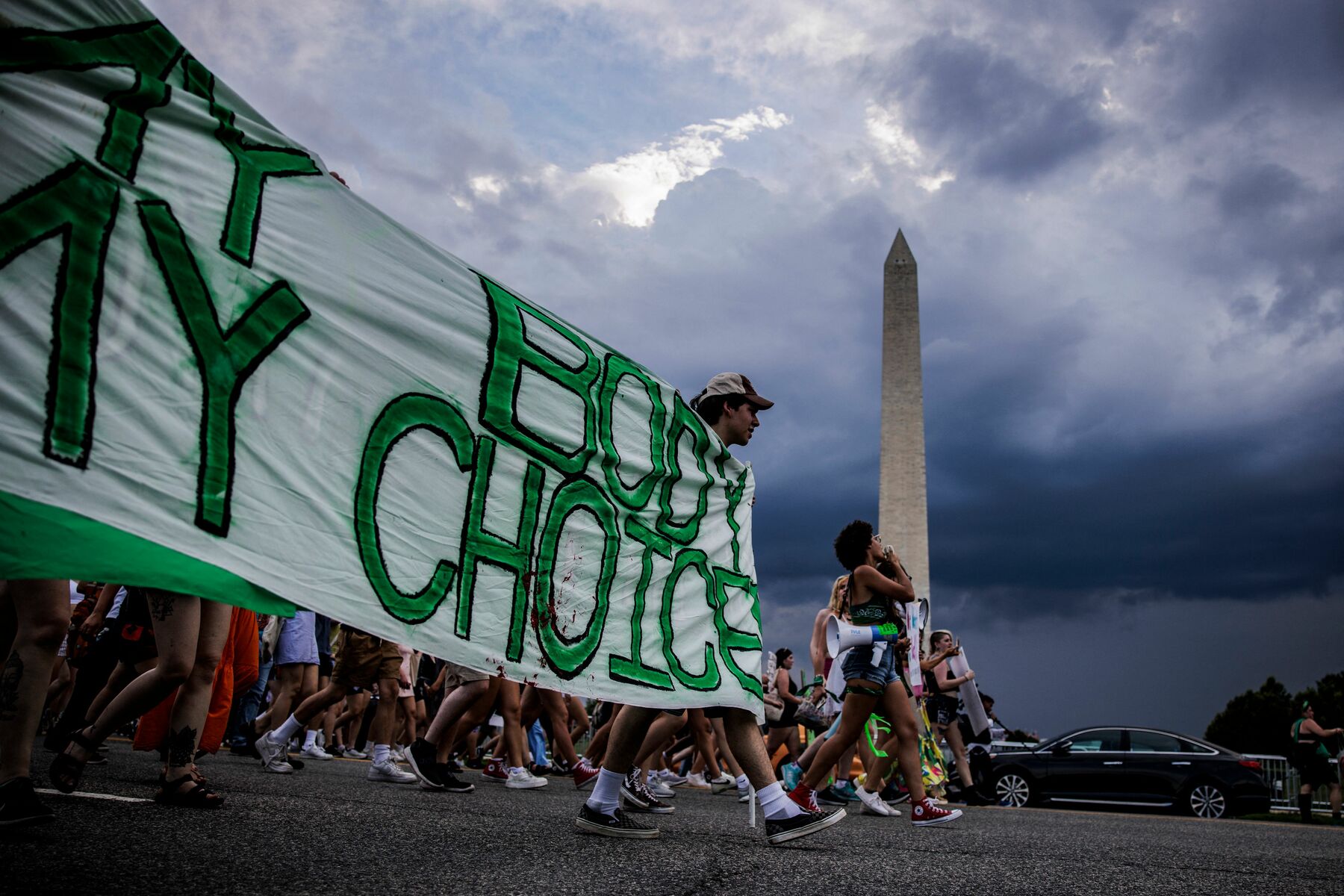After a relatively subdued response to the Supreme Court’s decision overturning Roe v. Wade, the Biden administration had a busy week in reproductive rights policy. The executive office made several moves to protect abortion access across the country and delay state restrictions. Some lawmakers continued to urge the president to do more — but legal and policy experts acknowledge there might not be much more the executive branch can do to shore up abortion access as states move to pass their own laws, courts rule on the constitutionality of those laws and the U.S. Congress works to pass its own legislation.
The Department of Justice filed a lawsuit Tuesday against Idaho on the grounds that its abortion ban, set to take effect on August 25, violated federal law. That same day, Kansas, the first state to bring the question of abortion access directly to the electorate, voters showed up at the polls to protect abortion access, prompting President Joe Biden to quickly issue a statement in support and call on Congress to “listen to the will of the American people and restore the protections of Roe as federal law.” On Wednesday, Biden signed an executive order to help people seeking abortions cross state lines during the first meeting of the Interagency Task Force on Reproductive Healthcare Access,which Biden had assembled through a previous order.
Several experts told The 19th that the administration took “meaningful steps” but acknowledged the limitations the president faces in renewing or even preserving reproductive rights. Helen Silverstein, head of the government and law department at Lafayette College, said that the administration’s actions this week were notable because they sent a clear — if delayed — signal to the Democratic base that the executive branch is taking access to reproductive health care seriously. On July 8, two weeks after the Supreme Court overturned Roe, Biden issued an executive order outlining actions his administration would take to protect health care services — some of which are coming to fruition nearly one month later.
“What seemed to be slow movement in the immediate aftermath of Dobbs on the part of the Biden administration was disheartening to pro-choice advocates and people in the Democratic Party who really strongly support abortion rights and reproductive justice issues,” Silverstein said. “And so the fact that steps are now being taken provides some optimism to those who were hoping that the administration would lead more forcefully on the issue.”
One of the Biden administration’s strategies, experts said, is to delay abortion bans for as long as possible by bringing lawsuits and challenging state legislation. Anne Douds, chair of the public policy program at Gettysburg College, wasn’t optimistic that the president’s actions would make a significant impact but conceded that not much else could be done before the midterms. It’s Congress that can pass laws, Douds said, and it’s voters that will decide in several months who will be a part of that process.
“The Biden administration is trying to hang on with whatever limited powers they can use until hopefully in November people vote on the issue and we have sufficient numbers in Congress to make a path forward that codifies abortion protections,” Douds said.
Douds said the Kansas election, in which Kansans rejected a constitutional amendment that would have said abortion was not a protected right in the state, was a “good harbinger” of what could come during the midterms if the issue of reproductive rights drives large numbers of people to the polls.
Melissa Murray, a law professor at New York University, agreed that the Biden administration could have been “more assertive in communicating outrage” with daily updates on new restrictions across the country or more consistent denunciation of the Supreme Court’s decision. But Murray pushed back on the idea the president was too slow in acting.
“They’re sort of doing everything can, recognizing that things you do in the context of abortion may have really profound implications in other areas,” Murray said.
Last month, Biden said he was weighing whether to declare abortion access a public health emergency after calls to do so from his party. The declaration would give the administration more flexibility to reallocate funding, personnel and resources. In 2022, national public health emergencies have been declared because of monkeypox, COVID-19 and the opioid crisis. Murray argued that even if Biden were to declare a public emergency, it would likely be challenged and eventually struck down by the Supreme Court, impacting every future president’s ability to respond to emergencies.
“It’s not easy to focus solely on the question of reproductive rights,” Murray said. “These questions have tentacles that go beyond reproductive rights and could ostensibly, if decided by a hostile body, have real ramifications for just how government works. And that could be a real problem.”
There’s no silver bullet, and the administration must tread carefully, she said.

The “most impactful effort,” according to Murray, was this week’s lawsuit against Idaho. She said it was smart to invoke the federal Emergency Medical Treatment and Labor Act (EMTALA) in a suit that can easily be replicated for other states and it was a “genius” move to file it in Idaho, which is under the 9th Circuit Court of Appeals, long considered a liberal stronghold for its majority of Democratic appointees.
Passed by Congress in 1986, EMTALA requires all emergency departments that receive Medicare funds to treat emergency medical conditions regardless of a patient’s insurance status or ability to pay. U.S. Attorney General Merrick Garland announced on Tuesday the United States was filing a lawsuit against Idaho because its trigger law, which criminalizes physicians for performing abortions, might incentivize medical professionals to withhold emergency medical treatment to pregnant people. Garland also cited the Supremacy Clause in the constitution, noting that federal law takes precedence over state laws when there is a conflict.
Meanwhile, Democratic lawmakers are asking for further action. Democratic Sens. Elizabeth Warren of Massachusetts, Mazie Hirono of Hawaii and Tammy Baldwin of Wisconsin sent a letter to the heads of the Departments of Health and Human Services, Veterans Affairs, Justice and Homeland Security, urging them to use their authority to make medication abortion more accessible. The senators said they were encouraged by Biden’s executive order last month that promised to try to protect access to medication abortion, but provided seven concrete recommendations they wanted the departments to pursue.
“As states escalate bans and restrictions on abortion, there is more urgency than ever to take immediate steps to expand access to medication abortion,” Warren, Hirono and Baldwin wrote. “We support your efforts to take all possible actions to protect abortion access.”
The senators called on the federal government to: bring lawsuits to states that are denying patients access to FDA-approved medications; expedite an FDA review process to help make medication abortion more accessible sooner; declare a public health emergency; enhance state Medicaid programs to ensure access to medication abortion; add a miscarriage indication to medication labels; eliminate barriers to importation; and expand access to medication abortion for veterans.
In the interim, Murray said the abortion rights movement could learn something from the anti-abortion strategy: focus on state legislatures, focus on the courts, focus on the district attorney races to decide whether these bans will be enforced.
“We’re not going to win back Roe v. Wade in two months,” Murray said. “I may not live to see the restoration of abortion rights, and I think people have to sit with that right now. It took the conservatives 40 years to undo this, and it may take us just as long — maybe longer — to restore it.”







